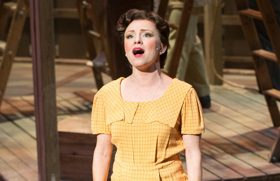Review: BRIGHT STAR Illuminates Front Porch Theatricals' Season

The southern charm of a North Carolina summer would only be complete with banjo music echoing through the peaks and valleys of the expansive Appalachian Mountains. In the year 1923, in the town of Zebulon, somewhere twixt the Atlantic coast and the Great Smoky Mountains, young love finds Alice Murphy (Erin Lindsey Krom) and Jimmy Ray Dobbs (Jerreme Rodriguez). Intimacy leads to divisions within the families, stories and decades are crossed and intertwined, and the stage for Front Porch Theatricals' bluegrass musical Bright Star is set.
"If You Knew My Story," sung with confidence and twang from the protagonist, Alice, opens the show and foreshadows her tale as remarkable and unbelievable. The stage begins to come to life in front of the audiences' eyes; the frame of a house is erected on stage and serves as the centerpiece for many scenes while Ms. Krom shows off what would be her consistent and convincing Carolinian accent.
Flashbacks and allusions jumping between the past of the 1920s and the present of the 1940s offer stark contrasts between two different times in Alice's life. In the 1920s, Alice is young, wild, and free. She challenges her parents and society and teases and chases after her love, Jimmy Ray. As the son of the mayor, Jimmy is weighted with his future and his father's legacy on his shoulders. All this changes when one night, Jimmy and Alice's love culminates and results in a premarital pregnancy.
Realizing the shame this would bring on the families, both Alice and Jimmy's fathers agree that Alice should be hidden from public view and the baby should be given up for adoption. Truly unthinkable is what follows, but for that, you will need to see the show.
While this story is being told, the show bounces to the present of the 1940s where Alice, now decades older, is an editor for the Asheville Southern Journal. In addition to Ms. Krom's vocal capacity and southern accent, her ability to shift characters from a young, carefree teenager to a rigid, serious bookworm is uncanny. The costumes she embodies helps with the shift, as well, but her acting shift is transformative to the point where I almost questioned whether past Alice and present Alice where being played by the same actress. (They were, and it's Ms. Krom!)
Also in the present of the 1940s, we are introduced to Billy Cane (Miller Jay Kraps), a young writer who just got back from the war. He is eager to have his pieces published in the prestigious Asheville Southern Journal, and with the help of his childhood friend Margo (Marnie Quick), he adamantly pursues his dream in the publication. Billy's and Margo's characters are everything that you would expect from childhood friends who never confessed their love for one another. Their awkward and shy quirks develop throughout the show as they become more mature and open to sharing their love for one another.
Aside from this awkwardness, there were a few peculiarities in the direction that stood out in the show. These were isolated to only when there were one or two actors on stage; larger ensemble scenes flowed smoothly, and choreographed dance scenes were phenomenal. As the choreographer, Mara Newbery Greer did a fantastic job of using the intimate space of the New Hazlett to arrange everything from graceful ballet duets to a rambunctious dancehall number in "Another Round."
Bright Star is unique for a multitude of reasons; the most notable is the music. With Steve Martin and Edie Brickell at the helm of the Tony-nominated score, Bright Star's bluegrass roots shine bright. A banjo, a fiddle, and a double bass are at the center of nearly every song. Whereas some Broadway shows might have a bluegrass feel in a single number, this score is built around the idea that the music of the Blue Ridge Mountains is the appropriate soundtrack for the story. Even if you're not the biggest fan of that old-time country sound, you can still appreciate the beauty of the production through the immersive story.
A story about love and tradition that also touches on forgiveness and humanity, Bright Star is a glimmer of hope that families can be accepting of differences, that lost relationships can be forged anew, and that matters of past can be learning experiences for the future. The beauty this production and all productions of Front Porch Theatricals lie in their propinquity with Pittsburgh talent. Showcasing this talent in productions like Bright Star makes for an experience that is felt from the heart.
To see or not to see score: 7/9; Recommended Show
Photo by: Deana Muro
Reader Reviews

Videos

